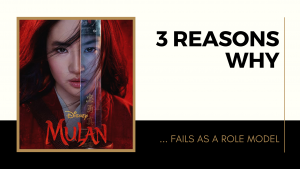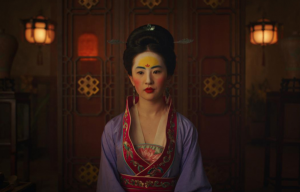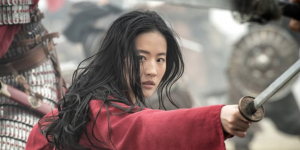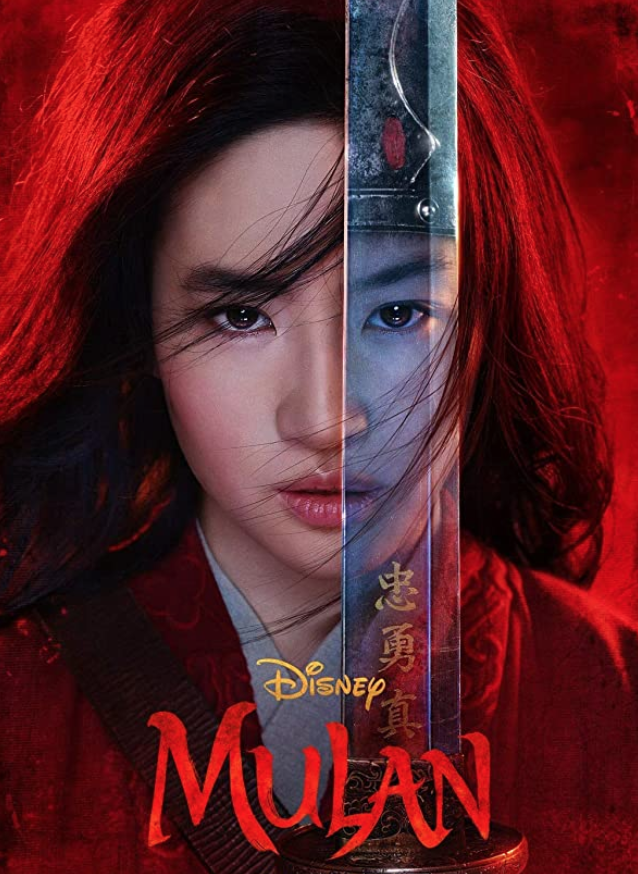
A lot has been said and written on the live version of the Disney animated movie Mulan. The general backlash the movie faces is largely due to some additions made to the plot which strip the main character from the elements that made her so appealing in the animated version. No songs, no sidekicks… Instead a sorceress, a lot of “Chi” and a will to set a new model of female empowerment. Does it work? Here are 3 reasons why a positive heroine fails to deliver.
1/ The unattainable one of a kind
The live action movie introduces right from the start Mulan as someone special. From a very young age she is nothing like any other girl in the village. She is sharp, quick, reckless. She loves her sister, respects her mother and cherishes her father. Moreover, she has a strong sens of duty. And when duty calls she is ready to put on an armor and go to battle. An armor she hasn’t earned but rather snatched in the middle of the night. But that’s a minor detail since her intentions are pure. On top of that, Mulan is gifted with something rare and exceptional: She has a powerful “Chi”. Of course, she must first learn to hide this unique talent until the right circumstances (or society) call for her to unveil it and save the day. What a relatable character! Don’t you agree?

In storytelling, creating such a perfect, one of a kind, protagonist always undermines any attempt to make her grow. Why should the audience care about her fortune or misfortune if a character has no space left to grow? Growth doesn’t come from our success. It comes from failing and how we deal with those failures. They are the ones that will shape us in becoming a better version of ourselves. So what is left to expect or fear for Mulan when she is portrayed as Miss Perfection? How could she ever fail? How could she even be challenged? If perfection in real life is boring, in movies it is anticlimactic.
2/ The unchallenged sexuality
At a young age, we first encounter Mulan acting like a boy – climbing on rooftops, running after roosters and chickens. All women in the village appear to be shocked by such attitude. But does this really qualify her as a tomboy?
Later on, Mulan puts herself in the middle of an all male dominant environment. In the military camp, she is forced to acknowledge her sexuality (she has boobs and no penis) and decides to hide it in order to blend in. She may disguise as a man but she doesn’t renounce her femininity. Interestingly enough, her femininity is showcased at the precise moment Mulan reveals herself as a mighty warrior. We see an asian beauty, hair floating in the air – fearlessly fight as a true brave man, lead and win the battle. It’s as if the movie wants the cake and eat it too. Where are the choices Mulan has to make in order to live like a man? Where are the sacrifices? The movie seems to say “You can have to all”! But can we?

Remember Arya Stark in Game of Thrones? How we first meet her as a true tomboy and how she evolves into this powerful woman who made her peace with the kind of femininity she is willing to give up in order to be who she wants to be? “A girl is Arya Stark”, and she is fascinating because she chooses to be a woman in a men’s world and to live by her own standards and not the ones imposed by society.
Remember G.I. Jane? Remember how Jordan O’Neil (Demi Moore) has to undergo a physical and psychological transformation in order to earn her spot in an all male environment? Maybe it’s a lot to ask from a Disney movie. Still, wouldn’t it be great if Mulan had a more complexe approach to this kind of challenged sexuality?
3/ Nothing changes, all remains the same
When it comes to the movie’s general plot, it is clear that behind the legend of a young girl who saves an empire there is a strong social discourse that is held. In the beginning of the movie Mulan fails to honor her family because she can’t play the part of the good girl. In order to be a good girl her parents ask her to succeed her introduction to the Matchmaker. She fails. What does this mean? Does it mean that Mulan will not find the right spouse? That she faces the horrible fate of becoming… a spinster?
Her parents are devastated but that doesn’t seem to worry her much. There are more important things to deal with. War is raging and Mulan decides to do good the only way she knows. When the Emperor calls for a general enrollment, secretly and in the middle of the night, she gets hold of her ill father’s sword and without his consent takes his spot.
As a young soldier – yet again – she fails to honor her oath to be truthful but tries to do good and successfully defends the Emperor by saving his life. As a reward for her bravery, she returns alone and dishonored to her village where she has fallen from grace and where she is welcomed as an outcast.

Eventually, the conclusive reward comes from the Emperor himself who grants Mulan an exceptional title and position in his guard and also finds her a good match that happens to be her love interest.
In such a win-win situation one can only add “…and they lived happily ever after”. It’s a pity that Mulan doesn’t bring any real change or balance in the way society functions. She has the opportunity to be granted the best that a man and a woman could ask for : a good carrier and a great personal life. However, she clears no path for other women to rise and evolve or for men’s perspective on women to advance. Unfortunately, Mulan is reduced to a shooting star instead of becoming the true pioneer she could be. In a sens, the sorceress’ motivations appear more genuine and relevant and her sacrifice meaningful.

